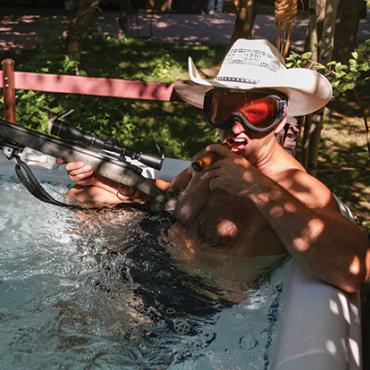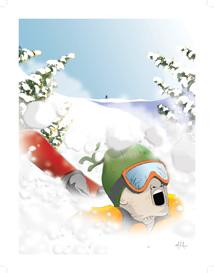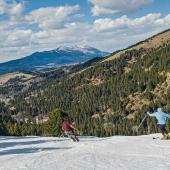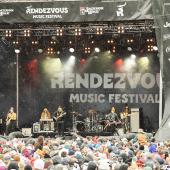The Road of Excess
Avalanches and aphorisms on Mount Blackmore.
“If you get buried down there and die,” Kent asks, “what do you want inscribed on your tombstone?”
Right now, my friend’s question—and his matter-of-fact tone—couldn’t be more appropriate. We’re standing on a small saddle, looking down a steep face of powder. To our left is Mount Blackmore, its rounded summit scraping the cloudless sky 200 feet higher up. A smaller, rockier promontory rises to our right. The high, uneven ridgeline extends outward on both sides, framing a wide basin below. Everything is white; even the evergreens and stony protuberances are upholstered in freshly fallen snow. I close my eyes and take a deep breath, tasting the clean, hard air, smelling nothing but fresh mountain pine.
We’ve already dug a snow pit, and as far as we can tell, things look okay. But neither of us is skilled enough to gauge the avalanche danger with any real accuracy. All we know is that Kent set off a small slide yesterday in a chute across the basin, and only his clear head and a fair amount of luck had saved him from getting thrashed. Now it’s my turn for first tracks, and as I look over the edge, I’m less than confident in my own composure and store of positive karma. A tombstone inscription seems, at this point, a sensible consideration.
But it’s not something to choose rashly; having spawned neither children nor the Great American Novel, a headstone would be my only mark upon this world, my single signature, my one and only legacy. It should, then, be a damn good one. There is also the thought of my family—mom, dad, brother, and two sisters—gathered around my grave, shocked and confused. What could I give them to alleviate their pain, to help explain my abrupt asphyxiation in the Montana wilderness? The inscription must answer their inevitable and painful question: Why?
The same question had occupied my thoughts over the last couple of days. We’d started up the trail at dawn the day before, cutting fresh tracks in the previous night’s eight-inch dump. Five miles and as many hours later, we slowed to a snail’s pace, post-holing it through waist-deep snow. I recalled a line by the English poet George Herbert. “Every mile is two in winter,” he wrote, and as my foot sunk deep once again, I decided that his estimate had been a conservative one. With heavy steps we climbed, and as we crested the ridge, there, finally, was the basin, broad and snow-laden. Mount Blackmore loomed high above, like a giant sentinel guarding his frozen domain.
Sweat-soaked and cold, my body feeling like hammered meat, I looked over at Kent. His chest was heaving like mine. I remembered the words of my friend Shawn, who had refused the invitation to join us for a weekend in the backcountry. “Why?” he’d asked. “I can get in 50 runs at Big Sky and not have to hike ten feet.”
I didn’t have an answer for him then, and as we plodded onward to find a good campsite, my body straining under what felt like a 200-pound pack, my mind whispered the same question: Why?
The avalanche came later that day, as the sun dipped behind a rocky peak to the southwest. After setting up camp and taking a much-needed break, we’d hiked up the southern face of the basin and traversed westward, stopping above a narrow chute. With only a moment’s hesitation, Kent strapped on his board and launched in. He made a few turns, and suddenly the ground began to move as a six-inch layer of snow detached from the main and floated down the mountain. As it gathered speed, the vast sheet broke into fragments, sending large chunks of snow tumbling end-over-end and raising a layer of silvery mist over the advancing slide. The thrust of snow swept Kent’s legs out from under him, whisking him down the slope butt-first. I saw him raise his legs high, place an arm out to each side for stability, and brace himself for the ride of his life.
From the top of the chute, I watched as my friend struggled to remain upright. Amazingly, he rode the slide like a champion bullrider, keeping his torso erect and pointed downslope. He even looked like he might actually be enjoying the ride. Until the rocks, that is.
A craggy mound of granite jutted out of the snow about halfway down the chute, and the slide swept Kent right over it. I cringed as his ectomorphic ass slammed into one rock after another, each collision followed by a loud, disquieting grunt. Below the rocks the chute widened and the slide, thinning and distended, spilled out into the basin in a broad alluvial fan. Within a few moments the mountain melee had ended, and Kent slowly stood up. “You okay?” I yelled down the chute.
A loud “Yahoooo!!” was his only reply. I pointed my board over the edge and dropped in. The snowpack uncovered by the slide was hard and unforgiving, and I nearly caught an edge and tumbled a few times before I came to a stop beside Kent. He was grasping his bruised backside and smiling. The initial terror of getting buried had subsided, and now he was just happy to be alive. Together we turned and looked up at the fracture line, then down at the deep, jumbled mass of snow below us. The whisper came again: Why?
That night, as we sat around the campfire, rotating our bodies regularly to thaw frozen parts, we drank merlot from cold aluminum cups and ate rock-hard cheddar (our unsuccessful attempt at a tasty aprés-ski treat) while Kent jokingly reveled in his newly acquired “avalanche survivor” status. He kindly reminded me of my first-tracks priority the next morning, explaining that I, too, might be lucky enough to become a snowslide veteran like him. I agreed that it was a nice designation, and thanked him for giving me a pleasant thought to fall asleep to; but right then, I couldn’t quite find the proper enthusiasm. My legs were starting to tighten up from the hike in, and my toes were frozen solid. I crawled into my sleeping bag cold, wet, and sore. Once more the whisper: Why?
In the morning, after cocoa and Pop-Tarts, we checked our avy beacons and started up the long ridge that led to Blackmore’s summit, below which was the steep, untracked face of fresh powder. The first half-mile was deep, soft snow, and we talked little as we pulled ourselves along by trunks and branches. About halfway up, the trees thinned and the wind-blown ridge offered solid footing. Thirty minutes later we were on the saddle, discussing avalanches and gravestone inscriptions.
Now, as I look down the precipitous slope below me, pondering Kent’s question, I ask myself once again, Why? Why are we here in this frozen landscape, risking an untimely winter burial? As I search for an answer, a quote from Willa Cather comes to mind: “That is happiness: to be dissolved into something complete and great.” Is that it? Are we here to find fulfillment, to be dissolved into the vastness of the natural world? That might be part of it, but we can get the same feeling in the summer, when we’re not freezing our asses off in the December snow. No, there must be something more to it.
A line from Tennyson’s Ulysses speaks to me next: “To strive, to seek, to find, and not to yield.” That explains the arduous hike, the avalanche, and the reckless pursuit of the perfect run, but all in all, it’s just too romantic and grandiose; after all, we’re only backcountry skiing, not fighting Trojans and enduring the wrath of Poseidon. Besides, if Kent gave that quote to my mom at the funeral, she’d never forgive dad for taking me to see Excalibur when I was 12.
Then it comes to me. The reason we’re out here, in this frozen wilderness, is to learn something. It’s not just about solitude, adventure, and virgin powder; it’s about discovery. We’re here to find a world that’s real, a world without that artificial, pervasive human coating—a world stripped of blindness and illusion, devoid of the unnatural safety and security of modern life. We’re here to encounter a place that is raw, primal, and indifferent, where snow will smother and kill a man without hesitation or remorse, where death is still a natural and necessary thing. We engage this world with vigor and zeal, abandoning our safeties, moderations, and comforts, immersing ourselves in its completeness, and surrendering ourselves to its arbitrary, indifferent doling out of life, death, and everything in between. It’s in this way that we truly become part of it, and thus begin to understand it.
I recall William Blake’s aphorism: “The road of excess leads to the palace of wisdom.” That’s it. That’s exactly why we’re here. The road is this mountain trail; our excesses are blood, sweat, frozen toes, sore muscles, and bruised backsides; our palace at road’s end is this mountain basin: a natural world that is, to echo Aldo Leopold, “wild, unconfined, and free.” A world of complete connectedness, where life and death interact on equal terms, where the end is best avoided, but never unexpected. A world that is absolutely real.
And so I give Kent my answer. He nods and straps on his board. I take a deep breath, swallow hard, and plunge forward, into the reality of green pines, cold mountain air, and fresh powder snow.













